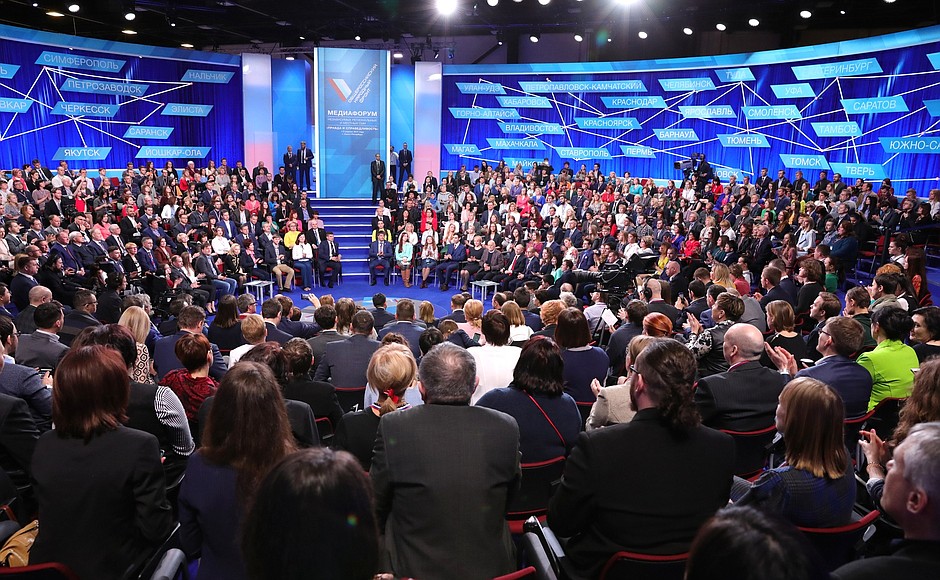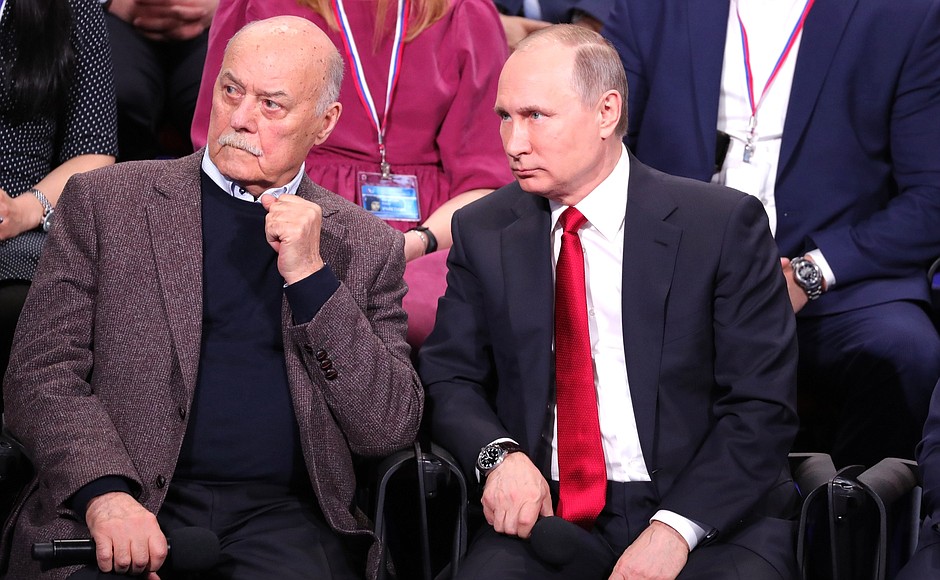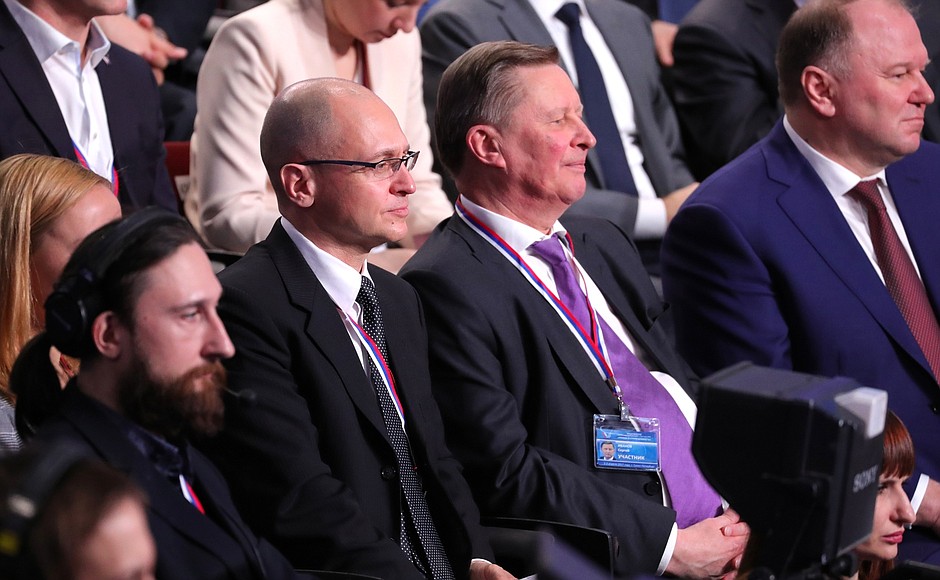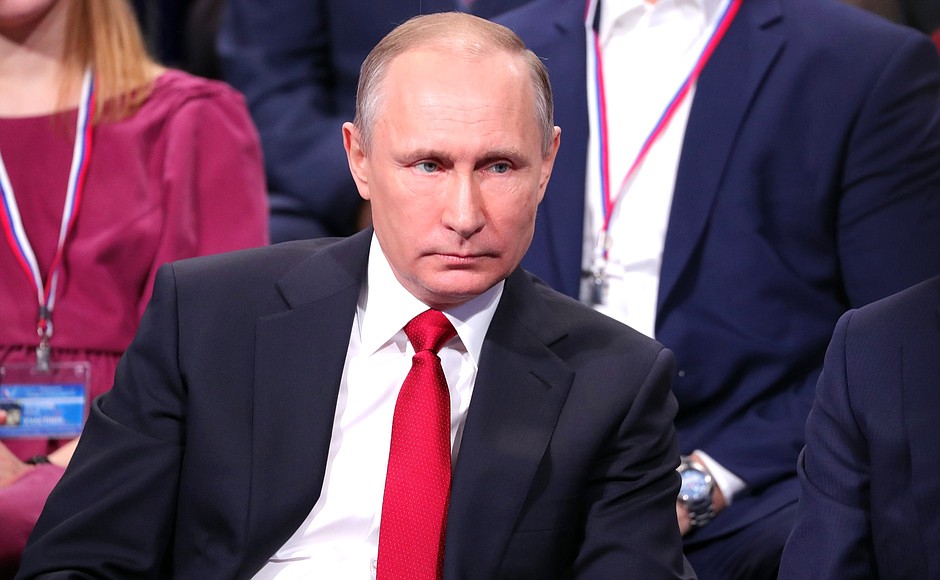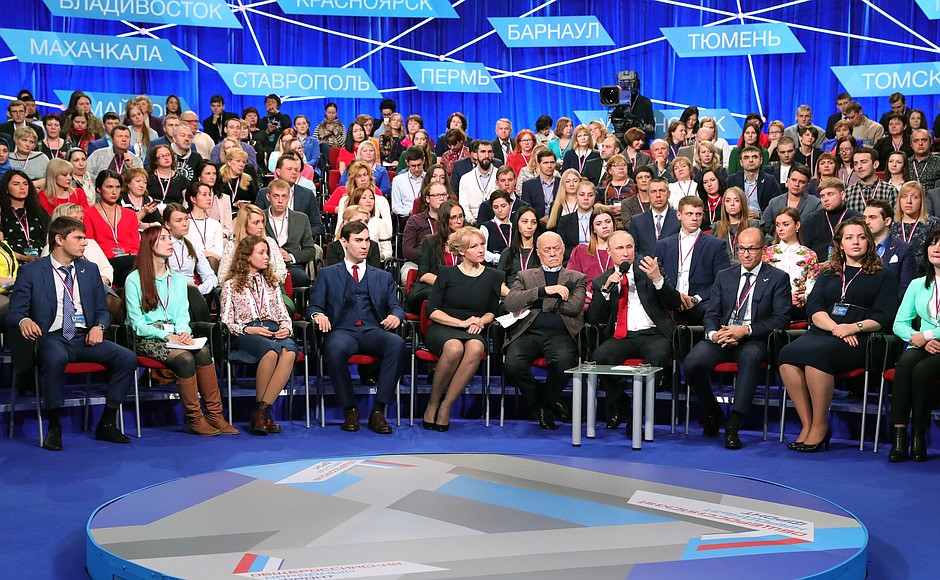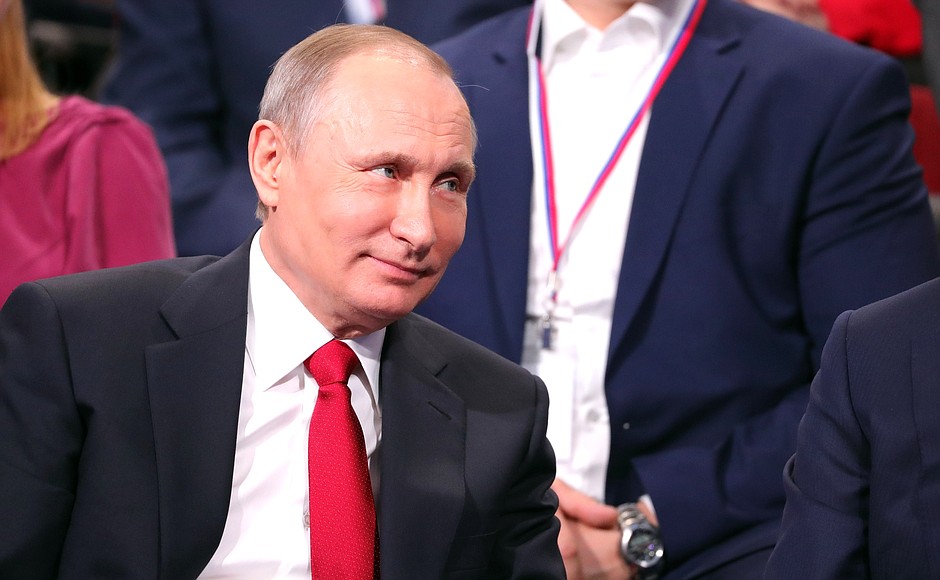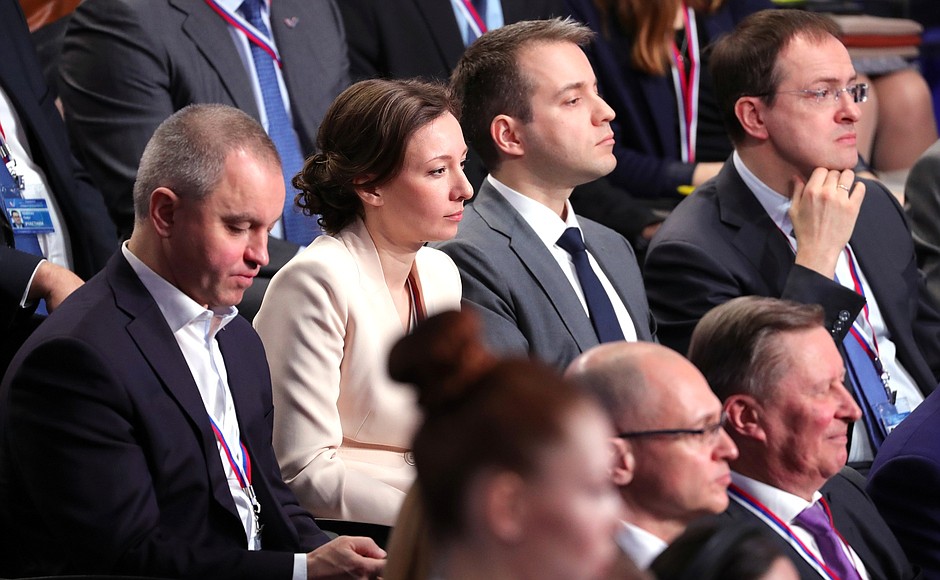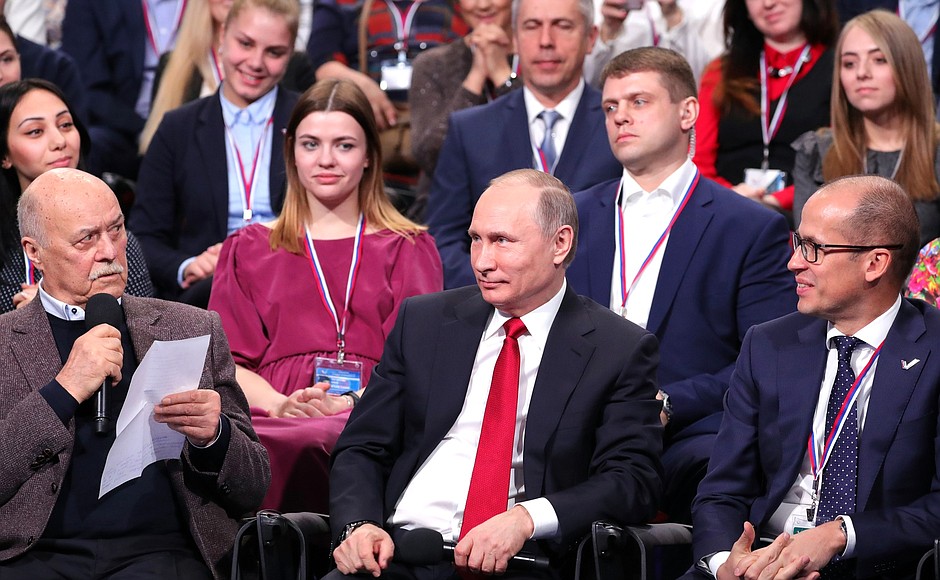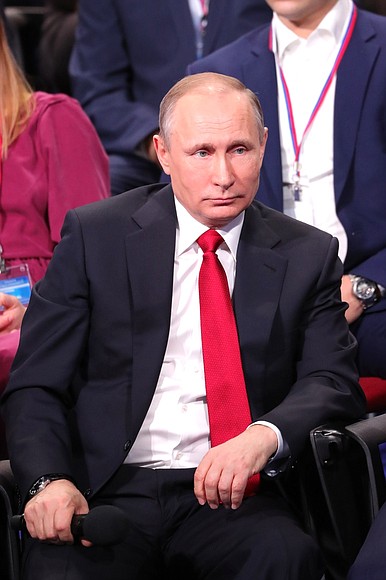Excerpts from transcript of Truth and Justice Forum of Local and Regional Media
President of Russia Vladimir Putin: Good afternoon, friends and colleagues.
This, I believe, is our fourth meeting. It has become a tradition, and I think it is a useful one.
It is always a great pleasure to meet with you. It is not only a pleasure, but quite useful as well, because this is precisely the feedback that we speak about so often.
Why is it so useful to meet with you in particular? Because you are quite literally on the frontline. You are among the people, you know the situation, see and understand what is happening, and express your point of view, which is of interest to me personally. Your colleagues from the federal media outlets are covering this event today, and it will be of interest and importance to the general public, to the millions of people who, via the media, will see and hear our discussion and give their own assessment to what I say and what you say. Through the Public Chamber, through the local deputies, and through you, the regional media, they can influence the decisions taken at regional, local and federal level. This is what our joint work is about.
Let me end my monologue here. I believe it will be more productive and interesting for all of us, and for our viewers and listeners, to follow our direct, live discussion.
Thank you very much.
<…>
Vladimir Putin: (Replying to remarks by Vladimir Pavlovsky, Krasnoyarsky Rabochy newspaper) You are fighting battles with the civil servants. Civil service bureaucracy is the cause of many problems, and this is something we keep coming back to over and over again. This is the case not only here, but in all countries, and the free press in a democratic society will always confront the authorities. This is absolutely right and proper.
I really would not like to see the press and the civil service locked in confrontation the whole time. I can assure you that the civil service counts in its ranks many patriotic, decent and active people. It is my great hope that you would see them as a source of support, and that they would see you as a source of support. This is extremely important, because if all we have is confrontation, this is just sticking spokes in the wheels on both sides, but if we work towards a common goal, we can obtain greater results.
Vladimir Pavlovsky: Mr President, we try to meet them halfway, but, sadly, they do not always reciprocate.
Vladimir Putin: Not always, this is true. Always would be impossible. We constantly fight for the final result and search for allies. But you definitely have allies, because upright civil servants and honest journalists have a common goal – the public good. We can have no other goal.
<…>
Ilya Remeslo: I am Ilya Remeslo, a blogger from St Petersburg.
Mr President, recently, we have seen a lot of illegal information on the internet, in particular, extremism and calls to commit suicide. Other countries often take a very firm line on such matters. Thus, China has put in place a whole system for blocking the internet with firewalls and restrictions on viewing big Western sites. At the same time, though, the internet is a useful tool for disseminating the sort of investigations that my colleagues and I conduct.
Do you think that Russia should copy the Chinese model of restricting the internet, or should we take our own path, a milder approach, so as not to restrict the right to publish useful information?
Vladimir Putin: We always take our own path, but this is true not only of us. In reality, nearly every country follows its own path. There are some common trends and rules, and we are in the trend, however, we do have to take into account the state of our society.
First of all, nowhere in the world will you find an all-permitting quasi-freedom on the internet. All countries impose restrictions of one sort or another on content and usage. Europe and the United States have strict regulation. This was introduced and implemented in earnest after the tragic events of 9/11 in the USA, and after a series of terrorist attacks in European countries.
I do not think that we have the right to criticise anyone, because all these restrictions and regulations should correspond to a society’s level of development. You and I remember the 1990s. There are plenty of young people here, but they probably also know that back then, democracy was first understood as meaning overall permissiveness, and the market was first seen as theft of state property. We were simply not ready for those processes then, but gradually, society matures and people start to understand what is good and what is bad, what we can accept today, and what is not needed. I therefore do not think that we are in a position to criticise China, for example. They have 1.5 billion people. Now, try governing 1.5 billion people.
Napoleon once said, “China is sleeping, and let’s hope that it continues sleeping for as long as possible”. However, China has long since woken up, and these processes need to be managed. This freedom in the internet, it is a space in which fibs might occur, automated fibs, even, that set the whole machine automatically in action and get it making appeals, agitating people for this or that, and all of this is done from a single centre… Of course, the authorities must keep this in mind and take measures to prevent possible threats.
Our restrictions are well known. We prohibit propaganda of suicide, child pornography, terrorism, drug trafficking and so forth. These restrictions are all in effect; though, if you remember, when all of this was back at the discussion stage, there were numerous fears that the authorities would start shutting everything down, banning everything. But no, we have not banned everything. Everything is working normally. Many people think that our measures are insufficient and say they should be tougher. This is the kind of sensitive issue that we need to work on and resolve together. The authorities should not take the approach that they always know best. Personally, I believe that these restrictions are sufficient at this point. I think that the general approach should be that whatever is prohibited by law is not allowed, and this should be implemented carefully, competently and in a civilised fashion on the internet. It is as simple as that. Whatever is not prohibited by law is allowed.
<…>
Irina Alexandrova: Irina Alexandrova, chief editor of internet site ulnovosti.ru, Ulyanovsk Region.
My question is about roads.
The Popular Front’s Road Inspection project began back in 2008. This year, public activists have gone a step further, in my view, with an interactive map of the Russian Federation’s ‘bombed’ roads, proposing that citizens mark their favourite ‘bombed’ road on this interactive map.
Do you think that this kind of Popular Front project could and should become a form of recommendation and aid manual for officials in their work?
Vladimir Putin: Yes, this is obvious. The Transport Ministry has its relevant public organisation, and you can work through them, but it is very important to have information support, coverage of the issue, because this enables us to understand the real situation.
When the Popular Front began tackling this issue, it motivated the federal government and, particularly, the regional authorities to take action, though we all agree that it is still far from resolved. But the necessary programmes have been launched, particularly thanks to these efforts. One of our priority programmes, for example, will bring 50 percent of the roads in big cities in line with the standards by 2018, and up to 85 percent by 2025. This kind of information will therefore be very valuable for achieving this noble cause.
Thank you.
<…>
Anna Votinova: Good afternoon, Mr President.
My name is Anna Votinova, I am a journalist and a volunteer from Voronezh Region.
The volunteer movement is a very relevant subject right now. Many people want to help others or receive help themselves, but do not know how to go about this. Information on the volunteer movements appears primarily on the social networks, only sometimes in the media. There is no single resource, no single internet resource, where all this information is collected in one place. In this situation, I have a proposal to establish a unified federal internet resource for volunteer work.
I have another proposal too. This year is the Year of the Environment. Next year could be the Year of Volunteer Work and Civic Activeness.
Another point is that around the world, people celebrate December 5 as Volunteers’ Day, but it is not widely marked in Russia. Perhaps it could be included on the list of national dates?
Thank you.
Vladimir Putin: Do you think that we do not have enough holidays? We are criticised for having too many holidays, and here you are suggesting to add another? Not a day off, right?
The idea is very good in itself. As you know, more and more people are joining the volunteer movement. As I have said before, publicly, and at various meetings, people are simply answering their heart’s call. I may be wrong, but I think around 7 percent of people here take part in volunteer work, and around 15 percent take part in public activities of one kind or another. This is a lot of people, a good figure. You are therefore right, of course, that we need to pay attention to these people, and support them, including moral support, and so it would be worthwhile marking Volunteers’ Day.
I will instruct the Government to do this and make sure that it would not cause any additional budget expense. Of course, for those who have the desire to be useful, an information resource would be of great help. Let us reflect on this and work on your proposal.
Thank you.
<…>
Olga Syomina: Good afternoon, Mr President,
I am Olga Syomina, from the town of Osa in Perm Region. I am in charge of covering cultural events in my newspaper, and I love theatre. Our Perm Opera and Ballet Theatre is known all over the world. It is a professional company that puts on brilliant productions.
Vladimir Putin: The Perm Opera and Ballet Theatre? You also have of the country’s best dance school.
Olga Syomina: We do.
Many theatres in our country receive federal grants, whereas the Opera and Ballet Theatre, a leading theatre in the country, along with the Mariinsky and the Bolshoi theatres, does not receive such support. Can the Perm Academic Opera and Ballet Theatre count on federal support?
Vladimir Putin: I mentioned the dance school. Indeed, along with the Vaganova School in St Petersburg and the Moscow school, it is one of the best in our country and one of the world’s best as well, without a doubt. There are good traditions, and the school is wonderful. Your theatre is more than 100 years old. It opened in 1890 or even 1870. Of course, it is an outstanding group of people with great traditions.
With regard to grants, this idea originated in 2003, but I was not the one who invented it. Well, actually, I came up with the idea, but I had a prompt from artistic director of the St Petersburg Philharmonic Yuri Temirkanov, who came to me in 2003 and convinced me that leading musical groups require immediate support. That is how the idea of these grants took shape.
This practice began to expand gradually. I believe 83 performing groups are now receiving presidential grants. Later on, we introduced government grants. Some regions offer regional grants. Overall, this practice makes sense. However, since 2012 (if Minister of Culture Medinsky is here, he will confirm that), we have not been increasing the total amount of grant support, and it has remained at the level of over 5 billion rubles. Therefore, adding another grantee to these 5 billion, given that this amount has never been adjusted for inflation, would mean that others would see their share cut. I repeat, we have not increased this amount since 2012, although, I know that Mr Medinsky raised the issue about increasing grant support with the Government. Therefore, we will definitely get back to this issue with the Government. However, grants will not resolve this issue in general. As I mentioned earlier, the grant idea came up during a very difficult financial and economic situation as an extraordinary tool. What we need to do is raise the level of material well-being of our leading collectives.
Do you know that the grants were also supposed to help preserve the leading musical groups at the international level, so that members of these groups were paid no less than the world's leading groups? Otherwise, with open borders, they would have simply left the country. As is known, labour – and music is also work, hard work – is looking for the best place to use their talents, that is how it works. We simply had to raise their salaries, perhaps not to match those of leading international musicians, but close, based on the living standards in our country and the fact that they live at home, amidst their language and their culture, which is also important. Actually, this is what we were guided by when we were making those decisions.
Let us look into what else can be done for such teams as the Perm Opera and Ballet Theatre. At least, we should adjust their salaries to inflation. Mr Medinsky, you will have to fight for this, and I will try to support you. We need to adjust the total amount of grant support. We have not done so since 2012, and it has shrunk like shagreen.
<…>
Co-Chair of the Central Headquarters of the Russian Popular Front Stanislav Govorukhin: May I add? I know from our previous forums that the most interesting conversation begins when you assume the role of stage director and start asking people questions. I feel that this moment is about to come. However, before you take over, I suggest that we change the tone of our conversation a little, from academic to more dynamic.
Yesterday, we had a glass jar here with a label: ‘The most concise question for the President.’ There was an unbelievable number of questions. I jotted down a few that I liked. Do you mind if I ask them now? Shall we do a quick round?
Do you have time for fiction?
Vladimir Putin: Yes.
Stanislav Govorukhin: Do you plan to drive across the Crimean Bridge?
Vladimir Putin: Yes.
Stanislav Govorukhin: Okay, I have a trickier one for you: who has it good in Russia?
Vladimir Putin: Film directors and other people in creative professions.
Stanislav Govorukhin: All right, I will take that.
What do you have in the morning, tea or coffee?
Vladimir Putin: Tea.
Stanislav Govorukhin: What is your favourite food?
Vladimir Putin: Kasha [porridge].
Stanislav Govorukhin: What kind?
Vladimir Putin: Today I had rice. Mostly, I have rice or buckwheat. Our traditional Russian cereals. I do not eat oatmeal. Millet, occasionally.
Stanislav Govorukhin: Where in Russia would you like to go where you have not been yet?
Vladimir Putin: Chukotka.
Stanislav Govorukhin: What Soviet cartoon should every Russian see?
Vladimir Putin: The one about the hare and the wolf.
Olga Timofeyeva: It promotes smoking.
Vladimir Putin: We have all kinds of stuff promoted. It is important to have the right perspective on things.
Stanislav Govorukhin: What is the most difficult thing for you to do?
Vladimir Putin: To get up in the morning.
Stanislav Govorukhin: Who will be the first to fly to Mars?
Vladimir Putin: A device of some sort. Why? Because everyone is planning a flight to Mars, but very few people are aware that with today's spacecraft, a living cell is unlikely to survive that far away from the Earth. A living cell is not protected by spacecraft in such remote space. Perhaps things are changing and such opportunities will become available soon, but there have been issues so far. That is why space research will be conducted using special equipment.
Stanislav Govorukhin: Do you listen to music? What kind?
Vladimir Putin: I do, every day. Rachmaninov, Bach, Beethoven, Mozart, and Tchaikovsky.
Stanislav Govorukhin: Where does the Motherland begin?
Vladimir Putin: Our Motherland is in our hearts. It all begins with our moms.
Stanislav Govorukhin: Do you have a dream?
Vladimir Putin: Yes, I do. (Laughter in the audience)
Stanislav Govorukhin: The people want a more detailed answer.
Vladimir Putin: No, you asked a question, I answered it. (Laughter in the audience)
Stanislav Govorukhin: Whom of the great Russians of the past would you like to meet?
Vladimir Putin: Peter the Great and Catherine the Great.
<…>
Alexey Gerasimov: Alexey Grasimov, deputy editor-in-chief of the newspaper Chas Pik [Rush Hour].
Mr President, you have recently been stressing the need to listen to people, to the nation. You know, perhaps they do listen, but the people have no feedback, no direct feedback.
In Sverdlovsk Region, they have abolished direct elections of mayors of cities and municipalities. An ordinary person here has no chance of being elected. The enterprises that sustain the cities and other big enterprises bring their finances to bear, and a person who is on his own has no chance. Therefore, I would like to ask, or to suggest, rather: perhaps we should bring back elections, direct elections of mayors and elections of deputies only in single-mandate constituencies.
Vladimir Putin: Nobody banned direct elections. Current law allows elections by direct secret ballot.
Alexey Gerasimov: Mr President, forgive me but you said recently that you know how public councils are elected (I think you were speaking at a medical meeting), and legislatures, unfortunately, are elected in the same way. It is very difficult to change that process. Any critical business in a locale will have its way.
Vladimir Putin: I often think about it myself, and believe me, we are the on same wavelength. But parliamentary democracy has many flaws and we see them everywhere. These flaws are inherent in the system of parliamentary democracy, they exist. In Europe they analyse it in great detail and criticise the gulf between the MPs and the people. If you read the analysis there, it is all the same thing.
When we allowed the local authorities to choose how to form local government bodies we assumed that direct vote by secret ballot and other forms would remain: you cannot elect a mayor but you can have him selected by the legislative assembly, sign a contract and so on. All this can of course be cancelled by federal law, the issue can be closed and everyone would be put on the same footing or herded into one cattle pen, but we would not like to do that. We would like to give people a chance to select the methods of forming local government bodies in a way that best suits their particular region.
You see, we are a multinational country; we have national republics, various ethnic entities, which have their distinctive features. For example, in some federal entities in the Caucasus one, two, three or four ethnic groups are considered to be pivotal and they must be represented in government bodies. But let us face it, people should be elected to government and administrative bodies on the strength of their personal merit, and not out of ethnic considerations. Right? However, the fact is that historically if some ethnic group is not represented, that becomes a problem there. We respect that because this has been the case for decades and perhaps centuries. They should be given a chance to solve these issues independently.
At the same time, it makes no sense introducing different regulations for national republics. For example, the second biggest ethnic group in Russia after the Russians are the Tatars. Half of them live in Tatarstan and the other half all over the territory of the Russian Federation. So, should we issue some regulations only for Tatarstan? And then other Tatars living in other regions would have a different set of rights? That is not possible. Nevertheless, we have to think about it, of course.
As for big businesses and other businesses that are systemically important for cities or villages and so on – you know, they will exert their influence anyway. I have been thinking about it. They will still exert their influence even if the population votes by direct secret ballot. You say rightly that they have financial and administrative clout, they have influence on their employee unions. The influence will still be there. We should invent such forms of direct democracy that would be efficient and would minimise risks. We should definitely think about it. We are on the same wavelength with you. We will think about it, OK?
<…>
Yulia Mamontova: My name is Yulia Mamontova. I came here from Irkutsk Region. I am a journalist with the newspaper Baikalskiye Zori in Olkhon District, on the shores of Lake Baikal.
My fellow townspeople will never forgive me if I do not ask you a favour. We have a huge number of unresolved issues on Baikal: environmental, socioeconomic, land-related and so on. For example, next year omul fishing will be prohibited. Thus, hundreds and even thousands of families will have no income. And many types of economic activities are already prohibited in the region.
Last year, you gave direct instructions, specifically to the Governor of Irkutsk Region and the President of Buryatia, to take measures to resolve the unemployment issue. However, they did not hold a single major meeting.
Therefore, we think a presidential envoy for Baikal should be appointed, to coordinate different government agencies that are constantly arguing with one another, and report to you.
Thank you.
Vladimir Putin: You raised some very important issues.
As for omul fishing, as you called it. Apparently, such instructions are for environmental purposes. If you catch everything, then there will be nothing to catch later on, and so it will still be prohibited, but due to tragic circumstances. Although, of course, in this case, it is also necessary to look carefully at whether this decision is correct and timely. Of course, we must think about employment. If this does not happen, then I promise you – I do not know whether we need a special envoy, I have so many envoys that I will not be able to remember their names soon – but the problem of employment is extremely important. If something is prohibited, then something else must be provided in return – that much is clear. And I promise to send a signal both to the regional authorities and the Russian Government.
<…>
Anton Parkhomenko: I am Anton Parkhomenko from Sevastopol Independent Television. First, prior to asking a question, I would like to thank you on behalf of all the residents, everyone I know, for the decision taken in 2014. It was very important for us. Thank you (Applause).
I suggest that all the country’s residents should come to Crimea, come to Sevastopol by all means. However, for you to enjoy your visit, we have to preserve our unique nature.
My question is related to the environment, and the issue concerns the Laspi reserve area. It is an amazing place on the southern coast of Crimea within the boundaries of Sevastopol. When we were part of Ukraine, about two thousand land plots were handed out, and construction has already begun on some of them, certain people were set on building large residential developments. The problem seems to have been dealt with, public hearings were held, and the creation of a specially protected natural area was approved. Yet there came, not trouble, but concern from an unexpected source. Reports emerged that the Ministry of Economic Development is drafting a law permitting the construction of apartment houses and hotels inside specially protected areas within city boundaries. I would like to draw your attention to a potential problem that may arise.
And a broader question to you. How can a balance be found between environmental protection and the development of Crimea – which receives huge amounts of funding, including Sevastopol, with the bridge to Crimea being built that will clearly have a massive development peak – so that we do not lose what we have?
Vladimir Putin: You know, you are asking an eternal question. It is eternal. It is like asking what love is. You see, there is always a clash between development and conservation, the conservation of nature and development. This should be primarily addressed by the Crimean and Sevastopol authorities alongside you, the residents, to determine where construction may and should be conducted, and where it is better to refrain from it and to preserve Crimea’s unique nature. It is unique indeed. We all know that it is a peninsula, but the distance between the landmass and the southern coast is 290 kilometres, I think. Indeed, the territory is right in the sea. Alongside the famous Crimean pine trees and other plants, there is also its unique climate. It is really unique, and it should be taken care of. Cutting-edge modern technologies should be used; city planning practices and norms should be toughened up. I do not even want to comment on what they have built there in the past decades, you know and see it for yourselves, it is monstrous. This is a consumerist attitude – to grab at any cost regardless of what will follow and what the coming generations will think of it.
However, we now have a unique opportunity to address these issues from scratch, very attentively and with great care. Are you upset about the decision allegedly drafted by the Ministry of Economic Development? I shall talk to my colleagues so that they resolve the issues with your participation, via respective public structures, even at the level of federal ministries and agencies – between the Ministry of Economic Development, the Ministry of Natural Resources and regional authorities. Not behind the scenes, not backstage. There is no other way.
<…>
Anastasia Vidyayeva: Mr President, I am Anastasia Vidyayeva, Mordovia State TV and Radio Company.
First, I would like to thank you for everything, because Russia has gone through different stages, and everyone here is aware of it (the falling oil prices and sanctions), but Mordovia is an agrarian republic, and this contributed to the development of the agro-industrial complex.
This is what my question concerns: will the support for agriculture, for farming continue? This is important. It promotes our development, and we see that things in our republic have improved.
Vladimir Putin: Indeed, there is neither oil nor gas in Mordovia – at least, they are not produced in commercial amounts – and agriculture is one of the main branches of its economy. Recently, agriculture has been showing good growth rates of over 3 percent. Mordovia is no exception. You have performed really well. You are probably aware of last year’s and this year’s federal support figures. It is not decreasing, but rather increasing, and we will continue it into the future.
However, I believe that the so-called sanctions you mentioned will not last forever, and if they continue forever, we will forever limit access to our market for the goods that we can make ourselves. We are not limiting imports of everything from all countries. We limit imports selectively. By and large, we use these sanctions to strike back, and do so not to harm, but to help ourselves. This is clearly helpful.
We will be guided only by this principle in the future. We will do everything that is good for us, and try not to do anything that hampers our development. Of course, we will support everyone in the agriculture industry, including small farms.
I am aware that there are many issues, with land in particular, and I am closely monitoring what is happening in Krasnodar Territory with land. I have repeatedly asked the prosecutor's office to investigate. I think that our colleagues in Krasnodar who are concerned about land issues will hear us. Just like them, I believe that we should not focus exclusively on large-scale production, although it is important. We need to provide support to farmers and small businesses. We will try to diversify this work and will never forget that almost 40 million of our citizens live in rural areas. A big thank you goes to them for their good work.
Remark: Thank you very much.
Vladimir Putin: Thank you very much. You know, I have to go now. Unfortunately. I have another meeting to attend.
Remark: Say hello to Lukashenko!
Vladimir Putin: I will certainly convey your greetings to Mr Lukashenko.
Thank you very much for your work. Good luck!
